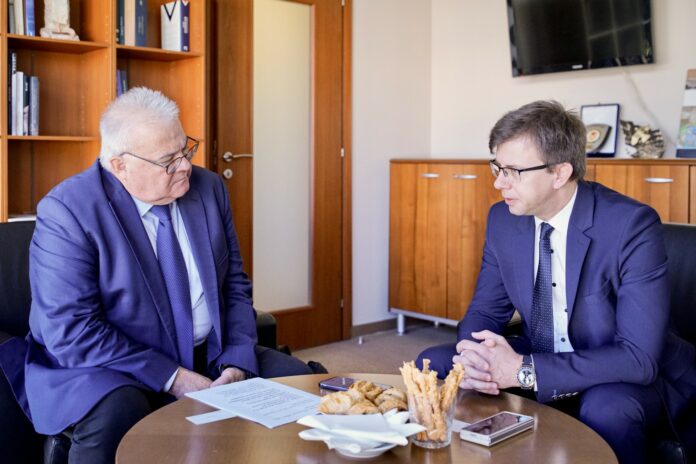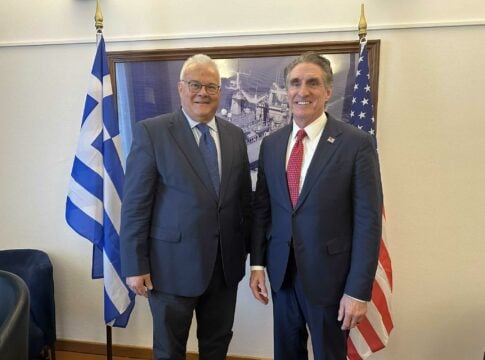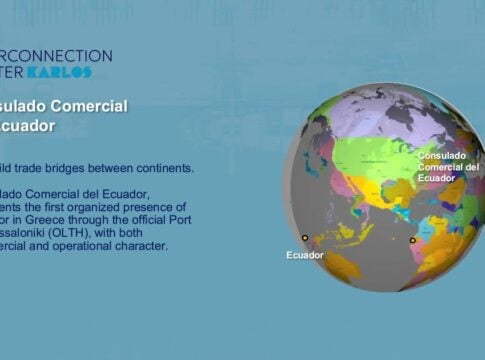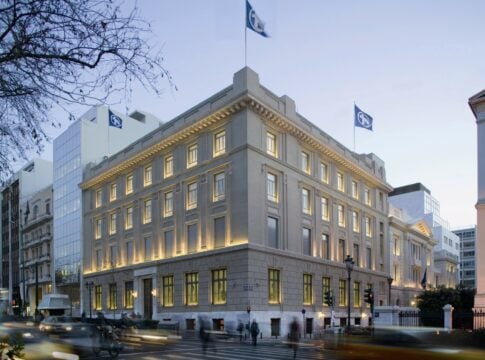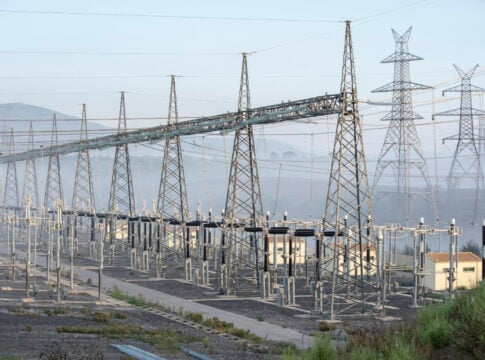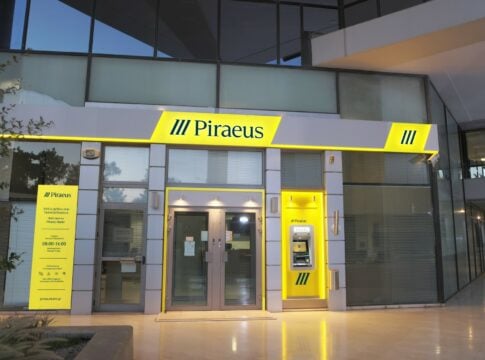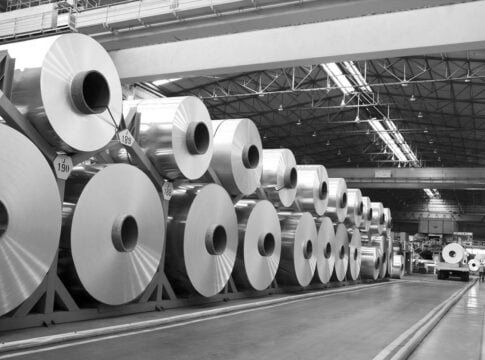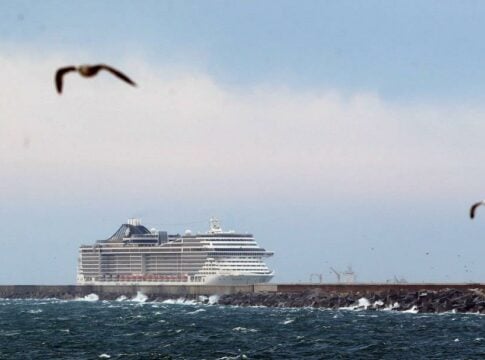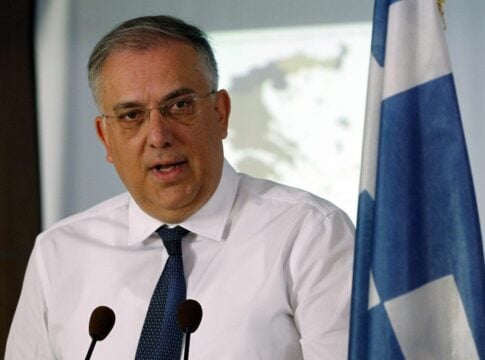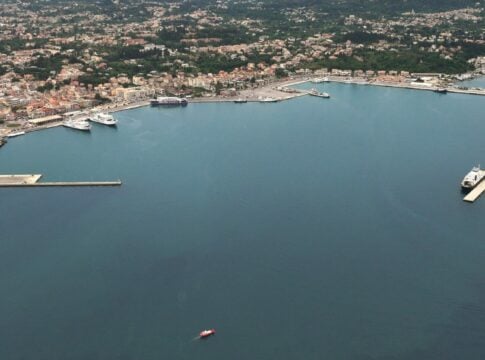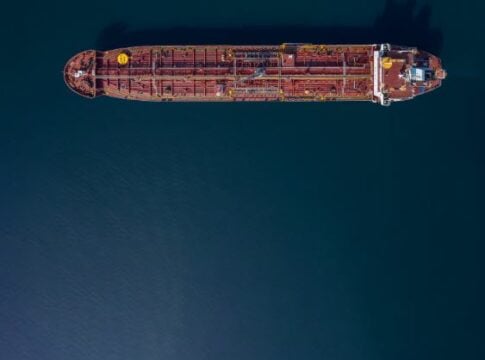“The core priority of the Hungarian presidency will be to give new dynamism to the European Union economic competitiveness,” the Hungarian Minister of European Affairs, Janos Boka, said in an exclusive interview with “Naftemporiki” and Michalis Psilos.
A few days before the official assumption of the presidency of the European Union for the next six months, Boka came to Athens to inform the leadership of the Ministry of Foreign Affairs about the priorities of the Hungarian presidency.
“We would like to create a new European competitiveness pact. And we hope that we will be in a position to have a political declaration along these lines adopted in November during the informal European Council in Budapest,” he said and added: “We also think that the European Union should continue addressing issues related to migration. We would like to focus on the external aspect, protecting the borders effectively.”
The Hungarian minister of European Affairs, strongly criticized the threatening statements by the Hezbollah leader against Cyprus.
“I think it’s very disturbing. Hungary is interested first and foremost in limiting the escalation of the conflict and of course, the geographical escalation of the conflict, especially concerning a member state of the European Union, is something that we strongly reject. And we believe that the global stability and the security of the region and in the European Union is our primary concern,” he underlined.
The full interview follows:
Dear Minister of European Affairs, Μr. Janos Boka, thank you so much for your interview to Naftemporiki.
Hungary will be President of the EU for six months, during a very critical era for Europe. You will shape the bloc’s political agenda and I would like to tell us the priorities of the Hungarian presidency.
-First of all, our presidency will start in a transitional period when we are after the European Parliament elections, and we are in the process of electing the new commission and also the new president of the European Council.
So the first strategic objective is to manage a smooth institutional transition and to allow the European institutions to function also in this transitional period.
In this period, the Hungarian Presidency will be the representative of continuity and stability.
We also want to be an honest broker and cooperate with all Member States and institutions in the spirit of sincere cooperation. And we would like to contribute to the strategic priorities of the European Union for the next five years, for the next institutional cycle.
One of those areas where we would like to give new dynamism to the European Union is economic competitiveness. This will be the core priority of the Hungarian presidency. And we would like to create a new European competitiveness pact on the basis of the discussion that has already started. And we hope that we will be in a position to have a political declaration along these lines adopted in November during the informal European Council in Budapest.
Also, we would like to strengthen the European security and defence policy based on a European defence industrial base, in order to cooperate in planning, research and development and also to coordinate the European defence procurement market.
We would like to have a strategic discussion on the future of the European cohesion policy. We believe that cohesion policy has been one of the most successful policies of the European Union, has been the first investment tool of the European Union that also contributed to the competitiveness of the EU as a whole.
We also think that discussion is needed on the European Common Agricultural Policy.
…Something, very, important for Greece, also.
Α number of member states believe that it needs to be more competitive. It needs to provide for the strategic food autonomy of the European Union. And it has to provide a decent living for European farmers. We also think that the European Union should continue addressing issues related to migration. We would like to focus on the external aspect, protecting the borders effectively.
It is also an area where we are very close to the Greek platform meaning concluding strategic partnership with the neighbouring countries in a comprehensive manner, but also with a view to, to curb illegal migration and address root causes of migration and facilitating returns.
This is extremely important for us. I believe that there is a clear political intention on behalf of the member states to tackle this issue a bit differently than they have done in the past five years.
And finally enlargement is also a priority. We would like to keep this an objective and merit based process. And we would like to accord equal political attention to the East and to the Western Balkans.
-Let’s take one by one, these priorities: “Μake Europe great again”, ιt’s your slogan. And in Brussels. I think that you had to answer a lot of questions about the same slogan with Donald Trump. What does this mean?
-This motto means that the presidency will be an active presidency. So this is not a descriptive motto. It’s a call for action. It means that the European Union looking at its economic potential, looking at its human capital, looking at its history, has the has the potential to be one of the global players of the new World Order
And for this, the European Union needs to be able to set its strategic priorities, communicate these strategic priorities, and to implement these strategic priorities in an autonomous way to act with partners and allies whenever possible, but also alone if necessary. And the Hungarian Presidency will work towards these objectives.
-Mr. Minister, we are witnesses of major divisions in Europe, for example, in the domain of immigration. What is your purpose?
-The issue of migration has been an issue of contention in the European Union. For us, it is important to focus on the consensual issues as a presidency. We believe that there are areas where there is already consensus.
And this is the external dimension of migration. I believe that there is consensus that the borders of the European Union could be protected more effectively.
It depends on the human and material resources. I believe the European Union should be able to support member states in these border protection activities, including physical border protection facilities. And I believe that the Frontex, as a European agency, should be steered more towards its traditional role of border protection instead of migration management.
– How does the Hungarian Presidency intend to help Greece to fulfil this task?
-I think there are many ways to do so. First of all, by working with the European institutions and member states to increase the number of neighbouring countries with whom we have a strategic cooperation agreement.
…Like Turkey.
-Like Turkey, Mr Psilos, but also in the Middle East and Northern Africa, there are a number of countries and areas with whom we could conclude these agreements that would also have an impact on migration.
I believe that the European Union should continue to finance border protection capacities, both human and physical, and also an adjustment in the priorities and focus of Frontex, on actual border protection could also help Greece also facilitating returns, meaning to leverage all the policy tools of the European Union, including visa policy, including development policy to induce countries to cooperate with us on returns would also have the situation.
-You mentioned Mr. Minister, that Hungary will work for a farmer-centered agricultural. What does this mean? A great vision, too…
-I think what we can immediately do is to reduce the administrative burden on farmers related to the Common Agricultural Policy. I’ve been taught by all stakeholders that this administrative burden is excessive. The Commission has already presented a proposal on this reduction, and the Hungarian presidency will handle this file as a priority. I also believe that we should take a look at market access to the European agricultural market.
I believe that a new balance must be found that allows for the strategic autonomy of the European Union and also provides a decent living for farmers. And I believe that we need to revisit the issue of the green transition and the Common Agricultural Policy.
I believe that the approach where the common, the common agricultural was regarded as part of the problem and not the solution is wrong. I believe that the Common Agricultural Policy and the agricultural sector in general could contribute to the green transition and should be looked at as an asset and not as a liability.
– Dear Minister, you said that the Hungarian Presidency will play an active role to drive forward the EU enlargement, regarding Moldova, Georgia and Ukraine. And as you understand, Ukraine is quite now the main problem…
-Well as we speak, there is now a political agreement on the negotiating framework for Ukraine. So, there is every possibility that we have an IGC, an intergovernmental conference with Ukraine and Moldova before the start of the Hungarian presidency, and also with Montenegro.
So during the Hungarian presidency, for these countries, we will continue the usual enlargement process as foreseen. Our idea is to use this dynamism to move more countries in the Western Balkans forward. We are ready to contribute as presidency to clear all the obstacles, including political ones. If we can be useful as presidency, we are at the disposal of member states.
-Are you going to promote any initiatives to put an end to the war in Ukraine and in Gaza, too?
-Well, it is the long standing position of the Hungarian government that the European Union needs to secure, first and foremost, the peace and security of the continent. This is what the Founding Fathers created the European Union for. And this is what our citizens expect from us.
And it has been the position of the government that to reach peace, first, we need a lasting ceasefire that would create the conditions for a peace agreement at the end of the day.
Of course, Hungary has limited influence and resources. But we can and will do whatever possible to bring peace back to the continent and to make sure that Europe brings peace to conflict areas and does not import conflict and war to the European continent. This has been the key priority of the Hungarian government. And this is the cornerstone and foundation of all the other priorities that we want to implement in the European Union, because all progress on these priorities depends on peace, security and stability on the continent.
-Have you any intention or idea, for example, Hungarian Presidency to organize a joint conference between Russia, Ukraine and Europe?
-The Hungarian government has always said that there is only a diplomatic solution to the conflict. We believe that there is no solution on the battlefield, that war will never bring peace. Only diplomacy and discussions will bring peace. And for this, you need to bring all the parties together. Again, I don’t think Hungary is a global player from this perspective. But as a country and as a presidency, we will do whatever we can to make this happen.
-Dear Minister, Greece and Hungary established diplomatic relations almost 70 years ago. Both countries are full members of the European Union, NATO and the Council of Europe. What about the current level of this relationship?
-I see no open political or economic issues between the countries. I think that the relationship is good and friendly, and this is a very solid basis to make progress. I think there could be room to improve and to further strengthen the economic and political relations between the two countries. I believe the common objective to fight illegal migration on the Western Balkans route is a common objective for both countries.
I believe that the governments have been cooperating very well to protect the Christian minorities in the surrounding region. The two countries have been cooperating when it comes to energy security and energy diversification. And I think that the cooperation of Greece in this area is vital and important. So I think that all these strategic issues provide us a great framework to proceed.
-And a last question, Mr. Minister. The leader of the Lebanese militant group Hezbollah, Hassan Nasrallah warned Cyprus that allowing Israeli forces to use its military infrastructure to target Hezbollah would be considered an act of war. What is your comment?
-I’ ve read the reports. This is all the information that I have for the moment. I think it’s very disturbing. Hungary is interested first and foremost in limiting the escalation of the conflict and of course, the geographical escalation of the conflict, especially concerning a member state of the European Union, is something that we strongly reject. And we believe that the global stability and the security of the region and in the European Union is our primary concern.
Thank you so much Mr. Boka for your very interesting interview.
-Thank you very much Mr. Psilos. And I really appreciate it.


